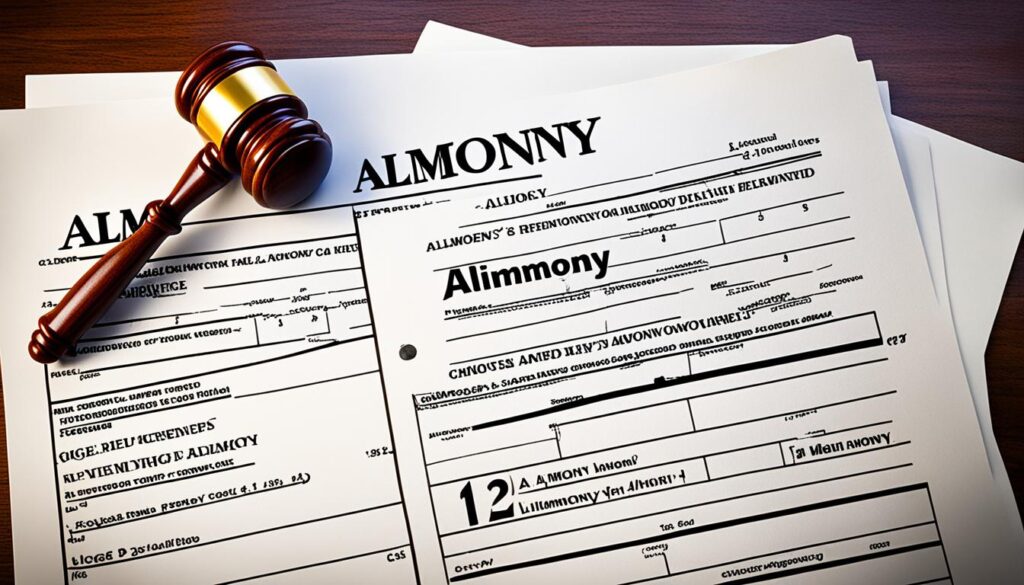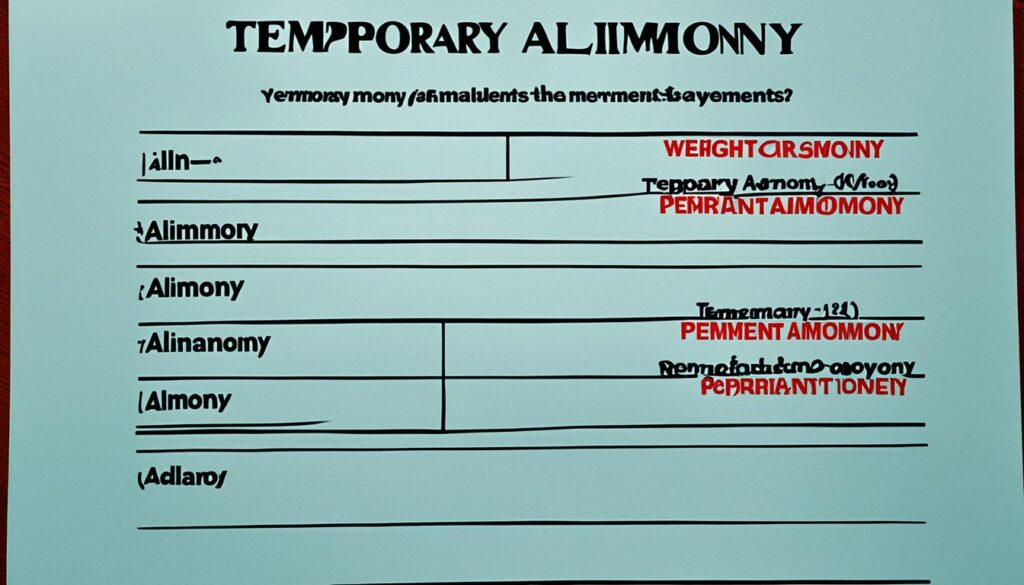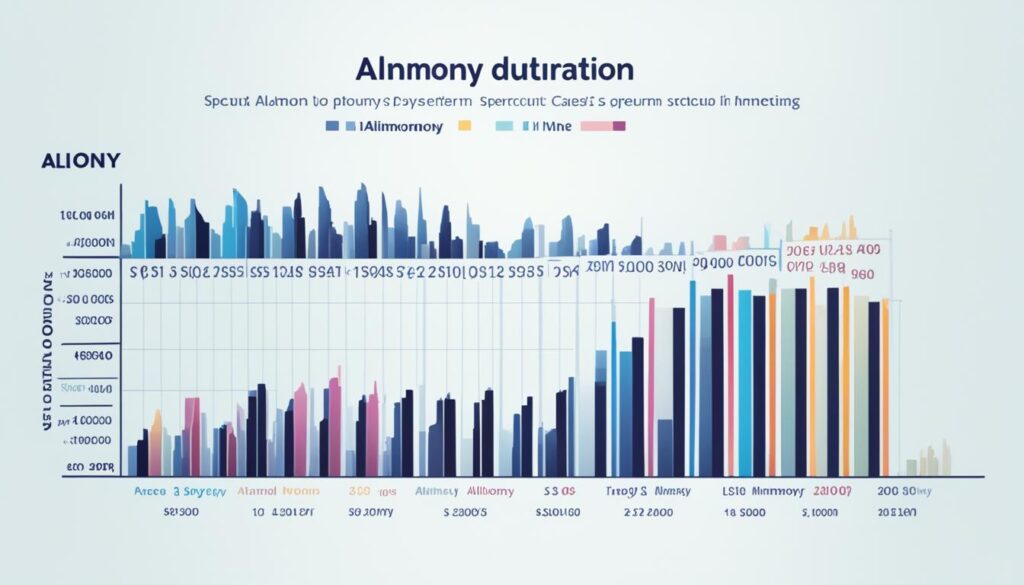Are you aware that alimony payments in the United States can have varying durations? From short-term agreements to extended support, the duration of alimony can greatly affect both the person paying and the person receiving it. If you are in the process of getting a divorce or thinking about spousal support, it is important to have a good understanding of alimony duration.
Key Takeaways:
- Alimony, also known as spousal support or maintenance, is awarded in certain divorce cases to ensure the lower-earning spouse has sufficient financial resources.
- The duration of alimony payments can vary based on factors such as the length of the marriage, earning disparity, lifestyle during the marriage, and financial needs.
- Alimony can be awarded on a temporary, durational, or permanent basis, depending on the circumstances of the case.
- Factors that influence alimony duration include the length of the marriage, earning potential, financial needs, lifestyle during the marriage, contributions made, and the reason for the divorce.
- Alimony may end with remarriage, cohabitation, death, or a significant change in the financial situation of either spouse.
What Is Alimony?
Alimony, also called spousal support or maintenance, is a financial obligation awarded in certain divorces to ensure that the lower-earning spouse has sufficient financial resources after the marriage ends. It is designed to prevent a significant decline in the quality of life for the recipient spouse.
Alimony serves as a form of financial support for the lower-earning spouse, who may have relied on the other spouse’s income during the marriage. It helps bridge the financial gap and provides the necessary resources to maintain a reasonable standard of living after the divorce.
Alimony is typically appropriate when there is a significant earning disparity between the spouses. For example, if one spouse earns significantly more than the other or if one spouse gave up their career or education opportunities to support the family, alimony may be awarded to ensure that the lower-earning spouse can meet their financial needs.
Alimony is not an automatic right in every divorce case. The court considers various factors, such as the financial resources and earning potential of both spouses, the length of the marriage, and the standard of living enjoyed during the marriage, to determine whether alimony is appropriate and the amount of support required.
Alimony provides the lower-earning spouse with the financial means to transition to a post-divorce life and helps to balance the financial disparity resulting from the end of the marriage.
It is worth noting that alimony can be awarded for a specific duration, until a specific event occurs, or on a permanent basis. The specific terms of alimony are typically determined through negotiation or by court order as part of the divorce settlement.
Understanding the concept of alimony is essential for anyone going through a divorce or contemplating one. By having a clear understanding of alimony and its purpose, individuals can better navigate the legal and financial aspects of the divorce process and ensure their rights and interests are protected.
When Is Alimony Awarded?
The decision to award alimony is typically made during the divorce settlement process. If the couple is able to come to an agreement, they can negotiate the terms of alimony payments themselves. However, if they cannot reach an agreement, the court will decide whether to award alimony and under what conditions. The court considers several factors including the age and health of each spouse, the length of the marriage, the contributions made by each spouse, and the financial needs of the recipient spouse.
During the divorce settlement, the **alimony decision** is an important aspect to consider. It helps determine the financial support one spouse may provide to the other after the marriage ends. If the couple cannot come to an agreement on their own, a **divorce settlement** may involve a court order indicating **spousal support** obligations. The court carefully examines various aspects of the marriage and the financial circumstances of each spouse to make a fair and reasonable decision.
The court analyzes the age and health of each spouse to understand their financial needs and capabilities. Furthermore, the length of the marriage is taken into account, as long-term marriages often involve more significant alimony awards. The court also looks at the contributions made by each spouse during the marriage, including work and homemaking duties, to assess their respective financial positions.
It is essential to note that every **court order** for alimony is unique and is based on the specific circumstances of the marriage and the individual needs of the recipients. The court’s primary objective is to ensure that the lower-earning spouse is provided with adequate financial support to maintain a reasonable standard of living after the divorce is finalized.
“The court’s decision to award alimony depends on various factors, such as the financial needs and contributions of each spouse. It aims to provide financial stability to the recipient spouse and ensure a fair division of assets and resources.”
Factors Considered in Alimony Awards
| Factors | Explanation |
|---|---|
| Age and Health of Each Spouse | The court considers the financial needs and capabilities of each spouse based on their age and health. |
| Length of the Marriage | Long-term marriages often involve alimony awards that provide substantial financial support. |
| Contributions Made During the Marriage | The court evaluates the contributions each spouse made to the marriage financially, as well as through work, homemaking, and child-rearing responsibilities. |
| Financial Needs of the Recipient | The court assesses the recipient spouse’s financial requirements to ensure an adequate level of support. |

How Long Does Alimony Last?
The duration of alimony can vary depending on the specific circumstances of each case. When the court orders alimony, it may be awarded on a temporary basis, a durational basis, or a permanent basis.
Temporary alimony lasts for a specific duration, typically while the divorce case is being resolved. It provides financial support to the recipient spouse during the transitional period.
Durational alimony is awarded for a set period of time. It allows the recipient spouse to acquire education or job skills to become self-sufficient, thereby promoting their long-term financial independence.
Permanent alimony is rare and usually reserved for cases with long marriages or certain exceptional circumstances. It continues indefinitely, providing ongoing financial support to the recipient spouse.
Understanding the different types of alimony duration is essential when navigating divorce settlements and determining the financial support necessary for the recipient spouse’s well-being.
To visualize the different types of alimony and their duration, refer to the table below:
| Type of Alimony | Duration |
|---|---|
| Temporary Alimony | Specific duration, typically while the divorce case is being resolved |
| Durational Alimony | Set period of time, allowing the recipient spouse to acquire education or job skills |
| Permanent Alimony | Indefinite duration, reserved for long marriages or exceptional circumstances |

As demonstrated by the table, alimony duration varies based on the specific circumstances of each case. Temporary alimony provides temporary financial support during the divorce process, durational alimony aids in the recipient spouse’s transition towards financial independence, and permanent alimony offers ongoing support for cases with long marriages or exceptional circumstances.
Factors That Influence Alimony Duration
Several factors can influence the duration of alimony payments. These include the length of the marriage, the earning potential of each spouse, the financial needs of the recipient spouse, the lifestyle enjoyed during the marriage, the contributions made by each spouse, and the reason for the divorce. Additionally, the presence of a prenuptial or post-marital agreement addressing alimony can also impact the duration of spousal support.
Evaluating the Length of the Marriage
The length of the marriage is a significant factor in determining the duration of alimony payments. Generally, longer marriages tend to result in longer alimony durations, as there is often a greater financial interdependence between the spouses. Shorter marriages may involve limited alimony durations, focusing on providing immediate support to the recipient spouse rather than long-term financial assistance.
Assessing Earning Potential
The earning potential of each spouse is another crucial consideration in determining alimony duration. If one spouse has a significantly higher earning potential than the other, they may be required to provide extended financial support to balance the economic disparity caused by the divorce. Earning potential can be assessed based on education, work experience, skills, and market conditions.
Considering Financial Needs
The financial needs of the recipient spouse play a vital role in deciding the duration of alimony payments. The court examines the recipient’s expenses, including housing, healthcare, education, and any other essential costs, to determine the extent of financial support required. The goal is to ensure that the recipient spouse can maintain a reasonably similar standard of living after the divorce.
Examining the Lifestyle During Marriage
The lifestyle enjoyed during the marriage can be a factor in alimony duration. If the couple lived an extravagant lifestyle with significant expenses, the recipient spouse may require longer-term financial support to retain a similar standard of living. Conversely, if the lifestyle during the marriage was modest, the alimony duration may be adjusted accordingly.
Weighing Contributions Made by Each Spouse
The contributions made by each spouse to the marriage, both financial and non-financial, are considered when determining alimony duration. Financial contributions, such as income and investments, as well as non-financial contributions, such as raising children and managing the household, are taken into account. Courts aim to recognize and compensate the efforts made by both spouses during the marriage.
| Factors | Impact on Alimony Duration |
|---|---|
| Length of Marriage | Longer marriages often result in longer alimony durations, while shorter marriages may involve limited durations. |
| Earning Potential | Significant earning disparities may lead to extended alimony payments to balance financial discrepancies. |
| Financial Needs | The recipient spouse’s financial requirements are assessed to determine the extent of support necessary. |
| Lifestyle During Marriage | Alimony duration may be influenced by the lifestyle enjoyed by the couple during their marriage. |
| Contributions Made | Both financial and non-financial contributions by each spouse are considered when deciding alimony duration. |
Additionally, the reason for the divorce can also impact alimony duration. For example, if one spouse’s misconduct significantly contributed to the breakdown of the marriage, it may affect the duration or amount of alimony awarded.

Circumstances When Alimony Ends
Alimony, a form of spousal support or maintenance, typically comes to an end under specific circumstances. These include:
- Remarriage: When the recipient spouse gets remarried, it commonly leads to the termination of alimony payments. The responsibility for financial support is transferred to the new spouse, recognizing the changed circumstances.
- Cohabitation: Alimony may also cease if the recipient spouse enters into a new cohabitation arrangement, where they start living with a new partner on a long-term basis. This new relationship can indicate a change in financial circumstances and the need for support from the ex-spouse reduces or ends.
- Death: The death of either party involved in the alimony arrangement terminates alimony payments. This is due to the cessation of the financial obligations and the loss of the recipient’s necessity for support.
- Change in Financial Situation: A significant change in the financial situation of either spouse can lead to the termination or modification of alimony payments. Examples of such changes include a substantial increase or decrease in income, job loss, disability, or retirement.
It is important to note that the termination of alimony is typically stated in the divorce settlement or court order, specifying the conditions under which alimony payments will end. These conditions help provide clarity and safeguard the rights and interests of both parties involved.
“The termination of alimony payments can be a significant milestone for both the ex-spouse receiving support and the paying party. It marks a transition towards financial independence and a new chapter in their lives.”
Understanding the circumstances under which alimony ends is essential for both parties involved. It ensures that the termination or modification of alimony payments is done fairly, in alignment with the changing circumstances and financial needs of the individuals.
Summary of Circumstances When Alimony Ends
| Circumstances | Effect on Alimony |
|---|---|
| Remarriage | Termination of alimony |
| Cohabitation | Termination of alimony |
| Death of either party | Termination of alimony |
| Change in financial situation | Potential termination or modification of alimony |

Types and Termination of Alimony
In the United States, there are various types of alimony that can be awarded to the lower-earning spouse during divorce proceedings. These types include temporary alimony, permanent alimony, rehabilitation alimony, and reimbursement alimony. Each type serves a specific purpose and can have different termination conditions.
Temporary Alimony
Temporary alimony, also known as pendente lite alimony, is awarded during the divorce process to provide financial support to the recipient spouse until a final settlement is reached. It helps ensure that the recipient spouse can maintain their living expenses and legal fees during this transitional period.
Permanent Alimony
Permanent alimony is less common and typically awarded in long-term marriages. It is intended to provide ongoing financial support to the recipient spouse until their death, retirement, or remarriage. The duration of permanent alimony can vary depending on the specific circumstances of the case.
Rehabilitation Alimony
Rehabilitation alimony aims to support the recipient spouse in gaining education or job skills to become financially independent. It is often awarded when one spouse sacrificed their career or educational opportunities for the benefit of the other spouse during the marriage. The duration of rehabilitation alimony is typically set for a specific period, allowing the recipient spouse to acquire the necessary skills or education.
Reimbursement Alimony
Reimbursement alimony is awarded to compensate the recipient spouse for financial investments made during the marriage. This type of alimony is typically awarded when one spouse supported the other’s education or business endeavors and seeks reimbursement for those investments. The duration of reimbursement alimony is generally determined based on the terms of the original financial arrangement.
It’s important to note that alimony can be terminated or modified under certain circumstances. Some common termination conditions include the recipient spouse’s remarriage, cohabitation with a new partner, or the death of either party. Alimony can also be terminated or modified if there is a significant change in the financial situation of either spouse or by mutual agreement between the parties involved.
Types of Alimony and Termination Conditions
| Alimony Type | Termination Conditions |
|---|---|
| Temporary Alimony | Final divorce settlement |
| Permanent Alimony | Recipient spouse’s death, retirement, or remarriage |
| Rehabilitation Alimony | Recipient spouse’s acquisition of education or job skills |
| Reimbursement Alimony | Fulfillment of the recipient spouse’s financial investments |
| All Alimony Types | Remarriage, cohabitation, significant change in financial situation, mutual agreement |

Legal Help with Alimony Matters
Seeking legal assistance during the divorce process is crucial, especially when alimony is involved. It is essential to protect one’s financial interests and ensure a fair outcome. An experienced divorce lawyer can provide the necessary guidance and support to navigate the complexities of alimony negotiation.
A skilled divorce lawyer will understand the nuances of alimony laws and help their clients make informed decisions. They will advocate for their client’s protection of rights and work towards achieving a favorable alimony settlement. With their expertise, a divorce lawyer can help negotiate the amount and duration of alimony payments based on the client’s financial needs and the circumstances of the divorce.
Whether it’s reaching a mutually beneficial agreement with the spouse or representing the client’s interests in court, a divorce lawyer plays a crucial role in securing a fair outcome in alimony negotiations. They have the knowledge and experience to argue for the appropriate level of financial support while considering all relevant factors.
“Having a skilled divorce lawyer by your side is essential when it comes to protecting your financial interests during the alimony negotiation process.”
By consulting a divorce lawyer, individuals can gain a clear understanding of their rights and entitlements regarding alimony. The lawyer will review the financial documents, assess the individual’s situation, and provide personalized advice based on their unique circumstances.
Benefits of Seeking Legal Assistance for Alimony Matters
- Expertise in alimony laws and regulations
- Professional guidance in negotiating alimony
- Representation during court proceedings, if necessary
- Protection of financial interests in alimony settlements
- Knowledge of recent legal developments and precedents
When it comes to alimony matters, individuals should prioritize their financial interests and ensure that their rights are protected. Seeking legal assistance from a qualified divorce lawyer is the best way to navigate the complexities of alimony negotiations and secure a fair outcome.

Understanding Length of Alimony Payments
The length of alimony payments is determined by several factors, including the duration of the marriage, the employability of the recipient spouse, and the presence of equal reimbursement for investments made by one spouse in the other’s education or business.
In general, the duration of alimony payments is linked to the length of the marriage. Shorter marriages often have shorter alimony durations, while longer marriages may result in permanent or long-term alimony.
Another key factor is the employability of the recipient spouse. If the recipient spouse is able to secure employment or acquire job skills during the alimony period, the courts may consider reducing the duration of the support.
Additionally, the presence of equal reimbursement for investments made by one spouse in the other’s education or business can also impact the duration of alimony payments. If one spouse has made significant financial contributions to support the other spouse’s career or educational pursuits, the courts may extend the alimony period to provide equal reimbursement.
Understanding the factors that influence the length of alimony payments can help divorcing couples and their attorneys negotiate fair and reasonable spousal support arrangements that take into account the specific circumstances of their marriage and financial situations.

Conclusion
Alimony, also known as spousal support, is a crucial financial support mechanism in divorce settlements. Its purpose is to ensure that the lower-earning spouse has necessary resources post-divorce. The duration of alimony payments varies depending on factors like the length of the marriage, the financial needs of the recipient spouse, and the payor’s ability to make payments. Understanding these factors and seeking legal assistance can help individuals navigate the complexities of alimony and achieve fair outcomes in their divorce settlements.
Divorce settlements can be emotionally and financially challenging, but alimony provides the necessary financial support for the lower-earning spouse. By considering the length of the marriage and the financial needs of the recipient spouse, the duration of alimony can be determined to help the recipient spouse maintain financial stability during the transition period. It is crucial for couples going through a divorce to address the issue of alimony adequately in their settlement negotiations to ensure a fair outcome for both parties.
When it comes to alimony, there is no one-size-fits-all approach. The duration of alimony payments can vary case by case, depending on the specific circumstances and factors involved. Factors such as the length of the marriage and the financial needs of the recipient spouse play a significant role in determining the duration of spousal support. Therefore, it is essential to consult with an experienced divorce lawyer who can guide individuals through the alimony process, ensuring their financial interests are protected and their rights are upheld.










